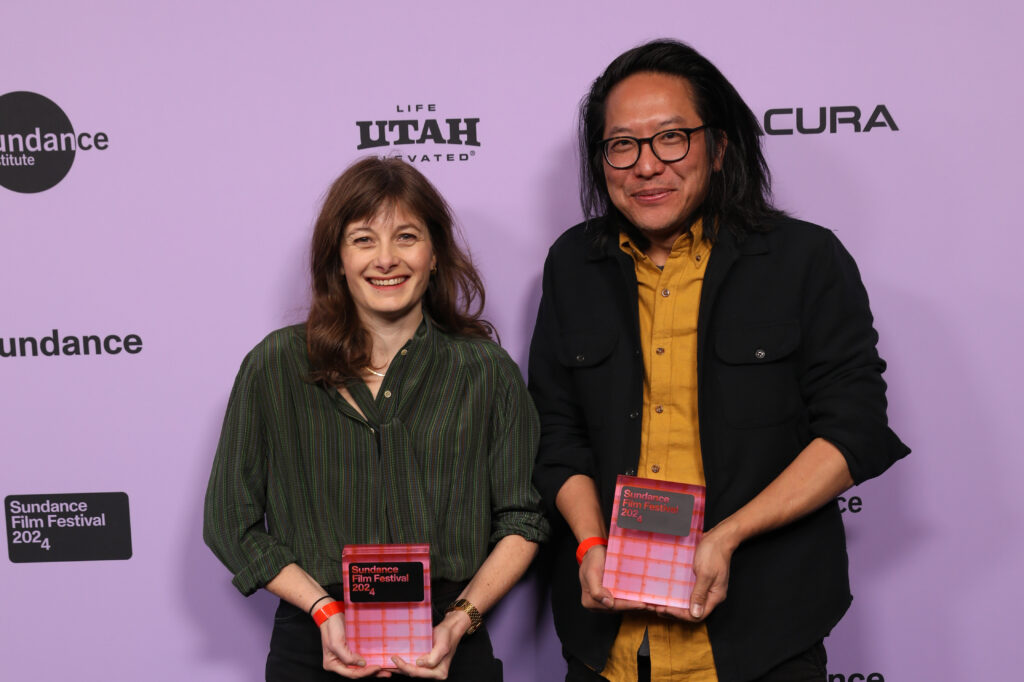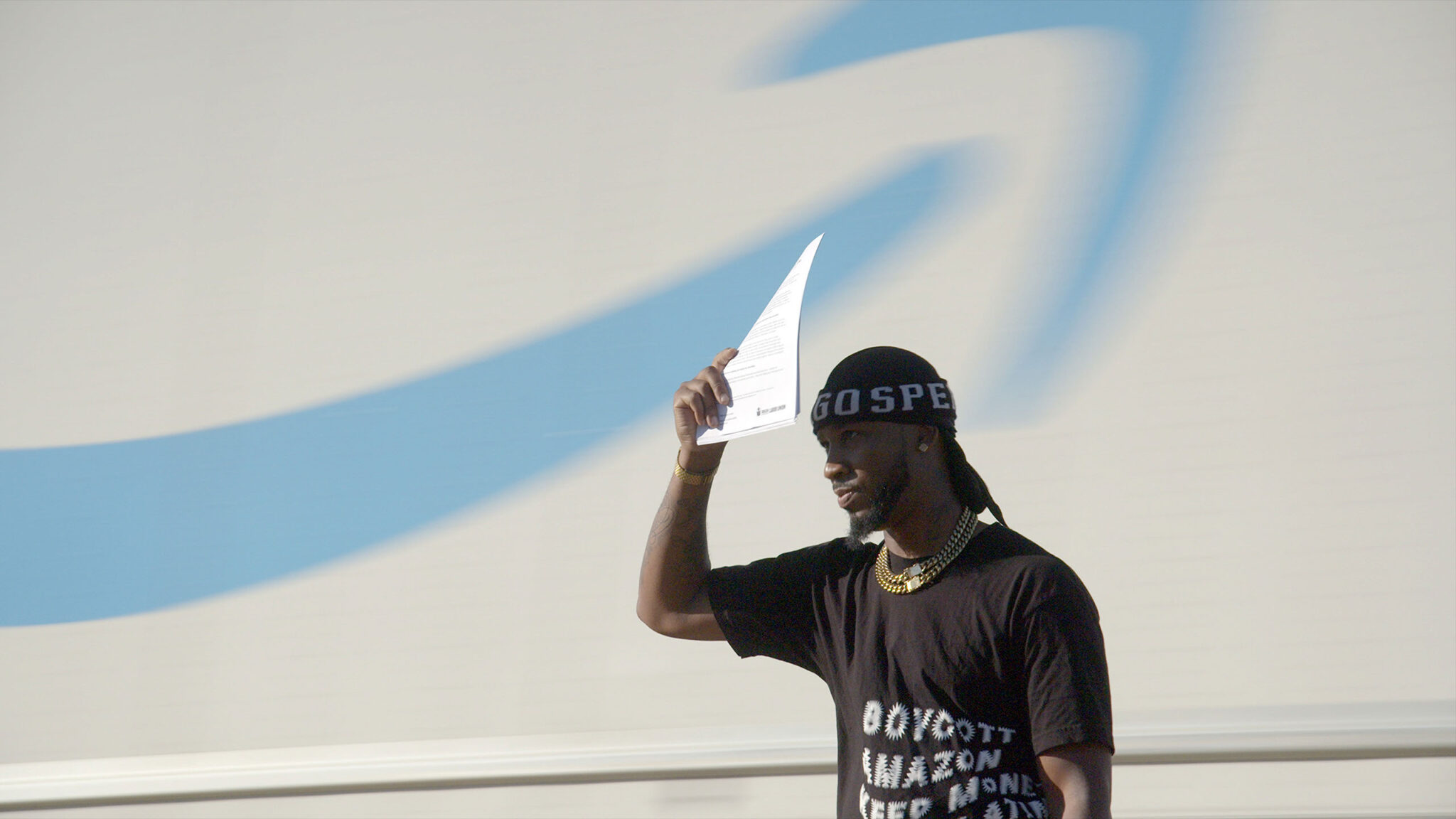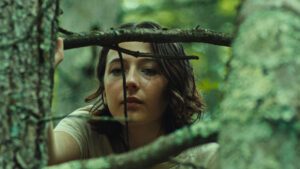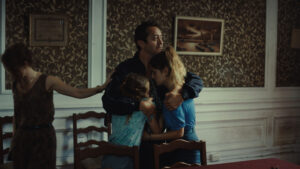By Lucy Spicer
One of the most exciting things about the Sundance Film Festival is having a front-row seat for the bright future of independent filmmaking. While we can learn a lot about the filmmakers from the 2024 Sundance Film Festival through the art that these storytellers share with us, there’s always more we can learn about them as people. This year, we decided to get to the bottom of those artistic wells with our ongoing series: Give Me the Backstory!
Filmmaker Brett Story says she wished she could be a musician, but her lack of pitch got in the way. She turned to radio documentaries instead, which then led to documentary filmmaking. “In film I discovered a medium that rewarded experimentation, complex thought, multimedia expression. I could play with sound and image and music and ideas to create experiences that were intellectual, sensorial, and emotional all at once,” explains Story. “It gave me a pretext to find people and ask them questions.”
Story’s curiosity about real people and her passion for telling their stories have led her to direct projects like The Hottest August (supported by Sundance Institute’s 2018 Documentary Edit and Story Lab and a Sundance Documentary Film Grant), and most recently, Union, co-directed with Stephen Maing and supported by a Sundance Documentary Film Grant. The timely Union follows the efforts of the groundbreaking new Amazon Labor Union — with a focus on the union’s determined founder, Chris Smalls — as the members stand up to one of the largest companies in the world. The film premiered at the 2024 Sundance Film Festival, where it won the U.S. Documentary Special Jury Award for the Art of Change.
Learn more about Story and her work below, including what prompted her to make Union and the feelings she hopes to inspire in audiences after they see the film.
What was the biggest inspiration behind this film?
I have been making labor films for almost two decades. My first feature documentary was the story of a blue-collar petrochemical town in crisis, and I’ve always been interested fundamentally in the question of how ordinary people come into political consciousness, or not, and under what circumstances. The global economy has been completely transformed over the past four decades, and alongside that, organized labor has been on the decline. It felt important to tell a story about a new generation of labor organizers, a post-Reagan generation that has only known union defeat and yet decides to take on the biggest company in the world. When the Amazon workers in Staten Island decided, against all odds and with no support, to start a union campaign, it felt like an opportunity to say something new and necessary about the politics of this moment and the kinds of labor struggle this restructured economy demands of us.
Describe who you want Union to reach.
Everyone!
Why does this story need to be told now?
We don’t have a lot of great labor films about the globalized economy. Today’s workers aren’t coal miners and automakers, they are warehouse workers and delivery drivers navigating a punishing, just-in-time global supply chain and a gig economy that tells them that they are expendable. We need a labor story that’s about today’s economic conditions, that shows people fighting — or even just grappling — with the way the economy relies on us all feeling disposable, and deciding instead to assert our value in the world by fighting for better conditions. After half a century of union defeat and decline, we are currently experiencing one of the biggest upsurges in labor action — even in Hollywood. So this is exactly the right time for a film that takes us from day one through to the end of one of the most important union victories in history.

How do you want people to feel after they see your documentary?
I want people to feel enraged, energized, flush with feeling, and determined. I think determined is the main thing. There’s a line that someone says at the beginning of the film: “You just need four or five people that you trust and that you know won’t betray you and who are committed, and you can turn a whole factory.” A sense of commitment can be hard to find in ourselves and others, especially when the future feels bleak and everyday life is so punishing. But it’s about forging commitment, together, and recognizing in ourselves the desire to fight with others that will be the balm against cynicism and despair.
What is something that all filmmakers should keep in mind in order to become better cinematic storytellers?
Be courageous, try and understand the things that are hardest to understand, listen past your own first thoughts.
If you weren’t a filmmaker, what would you be doing?
Painting and raising goats.
Films are lasting artistic legacies; what do you want yours to say?
I want it to say that ordinary people know that this world as it is doesn’t care about them and isn’t good for them, and that means that there is endless possibility for political struggle. Organizing with other people is really hard, and very little in life teaches how to achieve things collectively. But I’d love it if people watching this film might recognize themselves and their own desires for connection, belonging, purpose, and change in the extraordinary effort of these Amazon warehouse workers.
One thing people don’t know about me is _______.
I grew up in Palestine and my first language was Arabic.
What’s your favorite film that has come from the Sundance Institute or Festival?
I loved Last Things by Deborah Stratman, which played in the New Frontier section last year.










